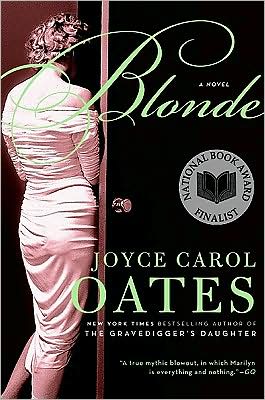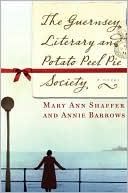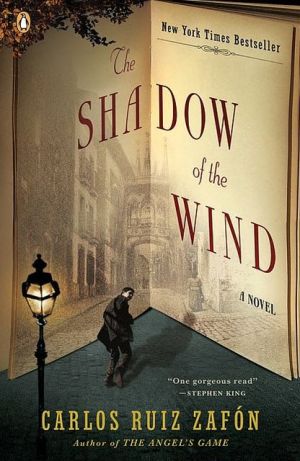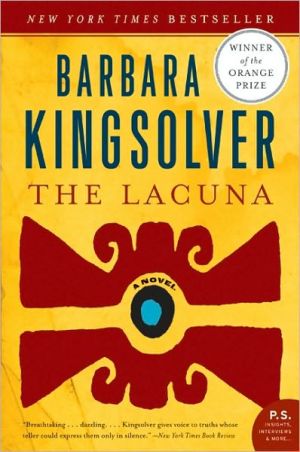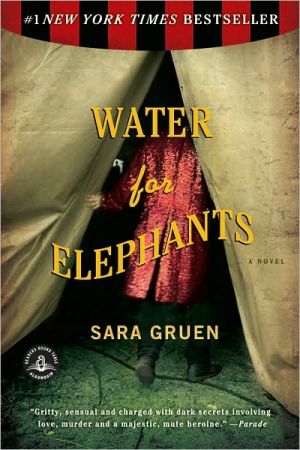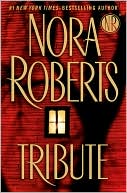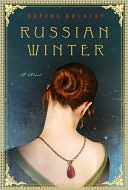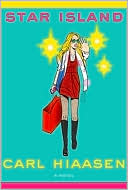Blonde
In this ambitious book, Joyce Carol Oates boldly reimagines the inner, poetic, and spiritual life of Norma Jeane Baker—the child, the woman, the fated celebrity and idolized blonde the world came to know as Marilyn Monroe. In a voice startling, intimate, and rich, Norma Jeane tells her own story, that of an emblematic American artist—intensely conflicted and driven—who has lost her way. A powerful portrait of Hollywood's myth and an extraordinary woman's heartbreaking reality, Blonde is a...
Search in google:
In this ambitious book, Joyce Carol Oates boldly reimagines the inner, poetic, and spiritual life of Norma Jeane Baker—the child, the woman, the fated celebrity and idolized blonde the world came to know as Marilyn Monroe. In a voice startling, intimate, and rich, Norma Jeane tells her own story, that of an emblematic American artist—intensely conflicted and driven—who has lost her way. A powerful portrait of Hollywood's myth and an extraordinary woman's heartbreaking reality, Blonde is a sweeping epic that pays tribute to the elusive magic and devastation behind the creation of the great twentieth-century American star.BookpageJayne Atkinson's performance in this audio presentation adds enormous dimension and depth. Without overacting, without cliche or caricature, she captures Monroe's breathy, hesitating voice and with it captures both the vixen and the victim.
\ \ \ \ \ Chapter One\ The Kiss\ \ \ This movie I've been seeing all my life, yet never to its completion.\ Almost she might say This movie is my life!\ Her mother first took her when she was two or three years old. Her earliest memory, so exciting! Grauman's Egyptian Theatre on Hollywood Boulevard. This was years before she'd been able to comprehend even the rudiments of the movie story, yet she was enthralled by the movement, the ceaseless rippling fluid movement, on the great screen above her. Not yet capable of thinking This was the very universe upon which are projected uncountable unnameable forms of life. How many times in her lost childhood and girlhood she would return with yearning to this movie, recognizing it at once despite the variety of its titles, its many actors. For always there was the Fair Princess. And always the Dark Prince. A complication of events brought them together and tore them apart and brought them together again and again tore them apart until, as the movie neared its end and the movie music soared, they were about to be brought together in a fierce embrace.\ Yet not always happily. You couldn't predict. For sometimes one knelt beside the deathbed of the other and heralded death with a kiss. Even if he (or she) survived the death of the beloved, you knew the meaning of life was over.\ For there is no meaning to life apart from the movie story.\ And there is no movie story apart from the darkened movie theater.\ But how vexing,never to see the end of the movie!\ For always something went wrong: there was a commotion in the theater and the lights came up; a fire alarm (but no fire? or was there a fire? once, she was sure she smelled smoke) sounded loudly and everyone was asked to leave, or she was herself late for an appointment and had to leave, or maybe she fell asleep in her seat and missed the ending and woke dazed as the lights came up and strangers around her rose to leave.\ Over, it's over? But how can it be over?\ Yet as an adult woman she continued to seek out the movie. Slipping into theaters in obscure districts of the city or in cities unknown to her. Insomniac, she might buy a ticket for a midnight show. She might buy a ticket for the first show of the day, in the late morning. She wasn't fleeing her own life (though her life had grown baffling to her, as adult life does to those who live it) but instead easing into a parenthesis within that life, stopping time as a child might arrest the movement of a clock's hands: by force. Entering the darkened theater (which sometimes smelled of stale popcorn, the hair lotion of strangers, disinfectant), excited as a young girl looking up eagerly to see on the screen yet again Oh, another time! one more time! the beautiful blond woman who seems never to age, encased in flesh like any woman and yet graceful as no ordinary woman could be, a powerful radiance shining not only in her luminous eyes but in her very skin. For my skin is my soul. There is no soul otherwise. You see in me the promise of human joy. She who slips into the theater, choosing a seat in a row near the screen, gives herself unquestioningly up to the movie that's both familiar and unfamiliar as a recurring dream imperfectly recalled. The costumes of the actors, the hairstyles, even the faces and voices of the movie people change with the years, and she can remember, not clearly but in fragments, her own lost emotions, the loneliness of her childhood only partly assuaged by the looming screen. Another world to live in. Where? There was a day, an hour, when she realized that the Fair Princess, who is so beautiful because she is so beautiful and because she is the Fair Princess, is doomed to seek, in others' eyes, confirmation of her own being. For we are not who we are told we are, if we are not told. Are we?\ Adult unease and gathering terror.\ The movie story is complicated and confusing, though familiar or almost familiar. Perhaps it's carelessly spliced together. Perhaps it's meant to tease. Perhaps there are flashbacks amid present time. Or flash-forwards! Close-ups of the Fair Princess seem too intimate. We want to stay on the outsides of others, not be drawn inside. If I could say, There! that's me! That woman, that thing on the screen, that's who I am. But she can't see ahead to the ending. Never has she seen the final scene, never the concluding credits rolling past. In these, beyond the final movie kiss, is the key to the movie's mystery, she knows. As the body's organs, removed in an autopsy, are the key to the life's mystery.\ But there will be a time maybe this very evening when, slightly out of breath, she settles into a worn, soiled plush seat in the second row of an old theater in a derelict district of the city, the floor curving beneath her feet like the earth's curve and sticky against the soles of her expensive shoes; and the audience is scattered, mostly solitary individuals; and she's relieved that, in her disguise (dark glasses, an attractive wig, a raincoat) no one will recognize her and no one from her life knows she's here, or could guess where she might be. This time I will see it through to the end. This time! Why? She has no idea. And in fact she's expected elsewhere, she's hours late, possibly a car was scheduled to take her to the airport, unless she's days late, weeks late; for she's become, as an adult, defiant of time. For what is time but others' expectations of us? That game we can refuse to play. So too, she's noticed, the Fair Princess is confused by time, Confused by the movie story. You take your cues from other people. What if other people don't provide cues? In this movie the Fair Princess is no longer in the first bloom of her youthful beauty, yet of course she's still beautiful, white-skinned and radiant on the screen as she climbs out of a taxi on a windswept street; she's in disguise in dark glasses, a sleek brown wig, and a tightly belted raincoat, closely tracked by the camera as she slips into a movie theater and purchases a single ticket, enters the darkened theater, and takes a seat in the second row. Because she's the Fair Princess, other patrons glance at her but don't recognize her; perhaps she's an ordinary woman, though beautiful, no one they know. The movie has begun. She gives herself up to it within seconds, removing her dark glasses. Her head is forced back by the angle of the screen looming over her, and her eyes are cast upward in an expression of childlike, slightly apprehensive awe. Like reflections in water, the movie light ripples across her face. Lost in wonderment she's unaware of the Dark Prince having followed her into the theater; the camera broods upon him as, for several tense minutes, he stands behind frayed velvet drapes at a side aisle. His handsome face is veiled in shadow. His expression is urgent. He is wearing a dark suit, no necktie, a fedora hat slanted over his forehead. At a music cue he comes quickly forward to lean over her, the solitary woman in the second row. He whispers to her and she turns, startled. Her surprise seems genuine though she must know the script: the script to this point, at least, and a little beyond.\ My love! It's you.\ Never has it been anyone except you.\ In the reflected shimmering light from the gigantic screen the faces of the lovers are charged with meaning, heralds from a lost age of grandeur. As if, though diminished and mortal, they must play out the scene. They will play out the scene. Boldly he grips her by the nape of her neck to steady her. To claim her. To possess her. How strong his fingers, and icy; how strange, the glassy glisten of his eyes, closer than she's ever seen them before.\ Yet another time, she sighs and lifts her perfect face to the Dark Prince's kiss.\ \ \ The Bath\ \ \ It is in early childhood that the born actor emerges, for it is in early childhood that the world is first perceived as Mystery. The origin of all acting is improvisation in the face of Mystery.\ \ —T. Navarro,\ The Paradox of Acting\ \ \ \ 1\ \ \ "See? That man is your father."\ There was a day, it was Norma Jeane's sixth birthday, the first day of June 1932, and a magical morning it was, blinding breathless whitely dazzling, in Venice Beach, California. The wind off the Pacific Ocean fresh and cool and astringent, smelling only faintly of the usual briny rot and beach debris. And borne, it seemed, by that very wind came Mother. Gaunt-faced Mother with her luscious red lips and plucked and penciled brows who came for Norma Jeane where she was living with her grandparents in a pockmarked old ruin of a beige stucco building on Venice Boulevard—"Norma Jeane, come!" And Norma Jeane ran, ran to Mother! Her pudgy little hand caught in Mother's slender hand, that feel of the black-net glove strange to her and wonderful. For Grandma's hands were chafed old-woman's hands, as Grandma's smell was an old-woman smell, but Mother's smell was so sweet it made you dizzy, like a taste of hot sugary lemon. "Norma Jeane, my love—come." For Mother was "Gladys," and "Gladys" was the child's true mother. When she chose to be. When she was strong enough. When the demands of The Studio allowed. For Gladys's life was "three dimensions verging into four" and not "flat as a Parcheesi board" like most lives. And in the face of Grandma Della's flustered disapproval, Mother led Norma Jeane in triumph out of the third-floor apartment reeking with onions, lye soap, and bunion ointment, and Grandpa's pipe tobacco, ignoring the older woman's outrage like a frantic-comic radio voice—"Gladys, whose car are you driving this time?"—"Look at me, girl: Are you hopped up? Are you drunk?"—"When will you be bringing my granddaughter back?"—"Damn you, wait for me, wait till I get my shoes on, I'm coming downstairs too! Gladys!" And Mother called out in her calmly maddening soprano voice, "`Qué sera, sera.'" And giggling like naughty pursued children, Mother and Daughter hurried down flights of stairs as down a mountainside, breathless and gripping hands, and so out! outside! to Venice Boulevard and the excitement of Gladys's car, never a predictable car, parked at the curb; and on this bright-dazzling morning of the first of June 1932 the magical car was, as Norma Jeane stared, smiling, a humpbacked Nash the hue of dishwater when the soap has gone flat, the passenger's window cracked like a spiderweb and mended with tape. Yet what a wonderful car, and how young and excited Gladys was, she who rarely touched Norma Jeane now lifting her with both net-gloved hands into the passenger's seat—"Whoops, baby-love!"—as if lifting her into the seat of the Ferris wheel at Santa Monica pier to bear her, wide-eyed and thrilled, into the sky. And slammed the door beside her, hard. And made certain it was locked. (For there was an old fear, a fear of Mother for Daughter, that during such flights, a car door might open, as a trapdoor might open in a silent film, and Daughter would be lost!) And climbing into the driver's seat behind the wheel like Lindbergh into the cockpit of the Spirit of St. Louis. And revved the motor, and shifted gears, and pulled out into traffic even as poor Grandma Della, a mottled-faced fattish woman in a faded cotton housecoat and rolled cotton "support" stockings and old-woman shoes, burst out onto the front stoop of the building like Charlie Chaplin the Little Tramp in frantic-comic distress.\ "Wait! Oh, you wait! Crazy woman! Hophead! I forbid you! I'll call the po-lice!"\ But there was no waiting, oh, no.\ Hardly time to breathe!\ "Ignore your grandmother, dear. She is silent film and we are talkies."\ For Gladys, who was this child's true mother, would not be cheated of Mother Love on this special day. Feeling "stronger, at last" and with a few bucks saved, so Gladys had come for Norma Jeane on the child's birthday (her sixth? already? oh, Jesus, depressing) as she'd vowed she would. "Rain or shine, sickness or health, till death do us part. I vow." Not even a seizure of the San Andreas Fault could dissuade Gladys in such a mood. "You're mine. You look like me. No one is going to steal you from me, Norma Jeane, like my other daughters."\ These triumphant, terrible words Norma Jeane did not hear, did not hear, did not, blown away by the rushing wind.\ This day, this birthday, would be the first that Norma Jeane would remember clearly. This wonderful day with Gladys who was sometimes Mother, or Mother who was sometimes Gladys. A slender darting bird of a woman with sharp prowling eyes and a self-described "raptor's smile" and elbows that jabbed you in the ribs if you got too close. Exhaling luminous smoke from her nostrils like curving elephant tusks so you dared not call her by any name, above all not "Mama" or "Mommy"—those "pukey-cute titles" that Gladys had long ago forbidden—or even look at her too intensely—"Don't squint at me, you! No close-ups. Unless I'm prepared." At such times Gladys's edgy brittle laugh was the sound an ice pick makes stabbing into blocks of ice. This day of revelation Norma Jeane would recall through her life of thirty-six years, sixty-three days, which was to be a life outlived by Gladys as a doll baby might be fitted snug inside a larger doll ingeniously hollowed out for that purpose. Did I want any other happiness? No, just to be with her. Maybe to cuddle a little and sleep in her bed with her if she'd let me. I loved her so. In fact, there was evidence that Norma Jeane had been with her mother on other birthdays of hers, at least Norma Jeane's first birthday, though Norma Jeane could not recall except by way of snapshots—HAPPY 1ST BIRTHDAY BABY NORMA JEANE!—a hand-lettered paper banner draped like a bathing beauty's sash around the blinking damp-eyed infant with the chubby-cute moon face, dimpled cheeks, curly dark-blond hair, and satin ribbons drooping in the hair; like old dreams these snapshots were blurred and creased, taken evidently by a man friend; there was a very young very pretty though feverish-looking Gladys in bobbed hair, kiss curls, and bee-stung lips like Clara Bow gripping her twelve-month infant "Norma Jeane" stiff on her lap as you might grip an object breakable and precious, with awe if not with visible pleasure, with steely pride if not with love, the date scrawled on the backs of these several snapshots June 1, 1927. But six-year-old Norma Jeane possessed no more memory of that occasion than she had of being born—wanting to ask Gladys or Grandma, How do you be born, was that something you did yourself?—to her mother in a charity lying-in ward at the Los Angeles County General Hospital after twenty-two hours of "unremitting hell" (as Gladys spoke of the ordeal) or carried in Gladys's "special pouch" beneath her heart for eight months, eleven days. She could not remember! Yet, thrilled to be staring at these snapshots whenever Gladys was in a mood to display them tumbled across whatever bed-spread atop whatever bed of Gladys's in whatever rental "residence," she never doubted that the infant in the snapshot was her as all through my life I would know of myself through the witnessing and naming of others. As Jesus in the Gospels is only seen and spoken of and recorded by others. I would know my existence and the value of that existence through others' eyes, which I believed I could trust as I could not trust my own.\ Gladys was glancing at her daughter, whom she hadn't seen in—well, months. Saying sharply, "Don't be so nervous. Don't squint as if I'm going to crash this car in the next minute, you'll make yourself need glasses and that's the end for you. And try not to squirm like a little snake needing to pee. I never taught you such bad habits. I don't intend to crash this car, if that's what you're worried about, like your ridiculous old grandma. I promise." Gladys cast a sidelong glance at the child, chiding yet seductive, for that was Gladys's way: she pushed you off, she drew you in; now saying in a husky lowered voice, "Say: Mo-ther has a birthday surprise for you. Waiting up ahead."\ "A s-surprise?"\ Gladys sucked in her cheeks, smiling as she drove.\ "W-where are we going, M-mother?"\ Happiness so acute it was broken glass in Norma Jeane's mouth.\ Even in warm humid weather, Gladys wore stylish black-net gloves to protect her sensitive skin. Gaily she thumped both gloved hands against the steering wheel. "Where are we going? Listen to you. As if you've never been in your mother's Hollywood residence before."\ Norma Jeane smiled in confusion. Trying to think. Had she? The implication seemed to be that Norma Jeane had forgotten something essential, that this was a betrayal of a kind, a disappointment. Yet it seemed Gladys moved frequently. Sometimes she informed Della and sometimes not. Her life was complicated and mysterious. There were problems with landlords and fellow tenants; there were "money" problems and "maintenance" problems. The previous winter, a brief violent earthquake in an area of Hollywood in which Gladys lived had left her homeless for two weeks, forced to live with friends and out of touch completely with Della. Always, however, Gladys lived in Hollywood. Or West Hollywood. Her work at The Studio demanded it. Because she was a "contract employee" at The Studio (The Studio was the largest movie production company in Hollywood, therefore in the world, boasting more stars under contract "than there are stars in the constellations"), her life didn't belong to her—"The way Catholic nuns are `brides of Christ.'" Gladys had had to board out her daughter since Norma Jeane was an infant of only twelve days, mostly with the child's grandmother, for five dollars a week plus expenses, it was a damned hard life, it was grueling, it was sad, but what choice had she, working such long hours at The Studio, sometimes a double shift, at her boss's "beckon-call"—how could she possibly take on the care and burden of a young child?\ "I dare anyone to judge me. Unless he's in my shoes. Or she. Yes, she!"\ Gladys spoke with mysterious vehemence. It may have been her own mother, Della, with whom she was feuding.\ When they quarreled, Della spoke of Gladys as a "hot-head"—or was it "hop-head"?—and Gladys protested this was a downright lie, a slander; why, she'd never even smelled marijuana being smoked, let alone smoked it herself—"And that goes double for opium. Never!" Della had heard too many wild and unsubstantiated tales of movie people. True, Gladys sometimes got excited. Fire burning inside me! Beautiful. True, at other times she was susceptible to "the blues," "down in the dumps," "the pit." Like my soul is molten lead, leaked out and hardened. Still, Gladys was a good-looking young woman, and Gladys had lots of friends. Men friends. Who complicated her emotional life. "If the fellows would let me alone, `Gladys' would be fine." But they didn't, so Gladys had to medicate herself regularly. Prescription drugs or maybe drugs provided by the fellows. Admittedly she lived on Bayer aspirin and had developed a high tolerance for it, dissolving pills in black coffee like tiny sugar cubes—"Can't taste a thing!"\ This morning, Norma Jeane saw at once that Gladys was in an "up" mood: distracted, flamey, funny, unpredictable as a candle flame flickering in agitated air. Her waxy-pale skin gave off waves of heat like pavement in summer sun and her eyes!—flirty, slip-sliding and dilated. Those eyes I loved. Couldn't bear to look at. Gladys was driving distractedly, and fast. In a car with Gladys was like being in a bumper car at the carnival, you hung on tight. They were driving inland, away from Venice Beach and the ocean. North on the Boulevard to La Cienega, and at last to Sunset Boulevard, which Norma Jeane recognized from other drives with her mother. How the humpbacked Nash rattled as it sped along, prodded by Gladys's restless foot on the gas pedal. They clattered over trolley tracks, braked at the last second for red lights, causing Norma Jeane's teeth to rattle even as she giggled nervously. Sometimes, Gladys's car skidded into the midst of an intersection like a movie scene of honking horns, shouts, and fists waved by other drivers; unless the drivers were men, alone in their automobiles, when the signals were friendlier. More than once, Gladys ignored a traffic policeman's whistle and escaped— "See, I didn't do anything wrong! I refuse to be intimidated by bullies."\ Della liked to complain in her jokey-angry way that Gladys had "lost" her driver's license, which meant—what? She'd lost it, the way people lost things? Misplaced it? Or had one of the policemen taken it from her, to punish her, when Norma Jeane hadn't been around?\ One thing Norma Jeane knew: She didn't dare ask Gladys.\ Off Sunset they turned onto a side street, and then another, and finally onto La Mesa, a narrow, disappointing street of small businesses, diners, "cocktail" lounges, and apartment buildings; Gladys said this was her "new neighborhood I'm only just discovering, and feeling so welcome in." Gladys explained that The Studio was "only a six-minute drive away." There were "personal reasons" she was living here, too complicated to explain. But Norma Jeane would see—"It's part of your surprise." Gladys parked the car in front of a cheap Spanish-style stucco building with decaying green awnings and disfiguring fire escapes. THE HACIENDA. ROOMS & EFFICENCY APTS WEEKLY MONTHLY RENTAL INQUIRE WITHIN. The street number was 387. $orma Jeane stared, memorizing what she saw; she was a camera taking snapshots; one day she might be lost and have to find her way back to this place she'd never seen before until this moment, but with Gladys such moments were urgent, highly charged and mysterious, to make your pulse beat hard as with a drug. Like amphetamine it was, that charge. As through my life I would seek it. Making my way like a sleepwalker out of my life back to La Mesa to the Hacienda as to the place on Highland Avenue where I was a child again, in her charge again, under her spell again, and the nightmare had not yet hap- pened.\ Gladys saw the look on Norma Jeane's face that Norma Jeane herself could not see, and laughed. "Birthday girl! You're only six once. You might not even live to be seven, silly. Let's go."\ Norma Jeane's hand was sweaty so Gladys declined to take it, instead prodding the child to move with her gloved fist, lightly, of course, playfully directing her up the slightly crumbling outside steps of the Hacienda and inside into an oven-hot interior, a flight of gritty linoleum-covered stairs— "There's someone waiting for us, and I'm afraid he may be getting impatient. Come on." They hurried. They ran. Galloping upward. Gladys in her glam- orous high heels, suddenly panicked—or was she playing at being panicked? was this one of her scenes? Upstairs, both mother and daughter were pant- ing. Gladys unlocked the door of her "residence," which turned out to be not very different from the former residence Norma Jeane vaguely recalled. There were three cramped rooms with stained wallpaper and stained ceil- ings, narrow windows, sheets of loose linoleum on bare floorboards, a cou- ple of Mexican rag rugs, a leaky-smelly icebox and a double-burner hot plate and dishes in the sink and shiny black roaches like watermelon seeds scut- tling away noisily at their approach. Tacked to the kitchen walls were posters of films with which Gladys had been involved and of which she was proud— Kiki with Mary Pickford, All Quiet on the Western Front with Lew Ayres, City Lights with Charlie Chaplin, at whose soulful eyes Norma Jeane could\ stare and stare, convinced Chaplin was seeing her. It wasn't clear what Gladys had had to do with these famous films, but Norma Jeane was mes- merized by the actors' faces. This is home! This place I remember. Familiar, too, was the airless heat of the apartment, for Gladys didn't believe in leav- ing windows open even a crack while she was away, the pungent odor of food smells, coffee grounds, cigarette ashes, scorch, perfume, and that mys- terious acrid chemical odor Gladys could never entirely wash away even if she scrubbed, scrubbed, scrubbed at her hands with medicinal soap and made them raw and bleeding. Yet these smells were comforting to Norma Jeane for they meant home. Where Mother was.\ But this new apartment! It was more crowded and disordered and strange to her than the others. Or was Norma Jeane older now, and able better to see? As soon as you stepped inside there was that suspended terrible moment between the first tremor of the earth and the next more powerful tremor that would be unmistakable and deniable. You waited, not daring to breathe. Here were many opened but unpacked boxes stamped PROPERTY OF STUDIO. There were piles of clothes on the kitchen counter and clothes on wire hang- ers on a makeshift clothesline stretching across the kitchen, so it looked at first as if there were people crowded into the kitchen, women in "cos- tumes"—Norma Jeane knew what "costumes" were, that they differed from "clothes," though she could not have explained the distinction. Some of these costumes were glitzy and glamorous, flimsy "flapper" dresses with tiny skirts and string straps. Some were more somber, with long trailing sleeves. There were panties and bras and stockings washed and neatly placed over the clothesline to dry. Gladys was watching Norma Jeane, as she stared open- mouthed at these clothes dangling overhead, and laughed at the child's con- fused expression. "What's wrong? Do you disapprove? Does Della? Has she sent you to spy? Go on—in here. Through here. Go on."\ She prodded Norma Jeane with her sharp elbow into the next room, a bed- room. It was small, with a badly water-stained ceiling and walls, and a sin- gle window, and a partly drawn, cracked, and stained shade over the window. And there was the familiar bed with its gleaming if slightly tar- nished brass headstead and goose-down pillows, a pine bureau, a bedside table piled with pill bottles, magazines, and paperback books, an overflow- ing ashtray perched atop a copy of Hollywood Tatler; more clothes strewn about, and on the floor more opened but unpacked boxes; and a large gar- ish movie still of The Hollywood Revue of 1929 with Marie Dressler in a diaphanous white gown on a wall beside the bed. Gladys was excited, breath- ing quickly and watching as Norma Jeane glanced anxiously around—for where was the "surprise" person? Hiding? Beneath the bed? Inside a closet? (But there wasn't a closet, just a beaverboard wardrobe leaning against a wall.) A lone fly buzzed. Through the room's single window there was visible only the blank smudged wall of the adjacent building. Norma Jeane was wondering Where? Who is it? even as Gladys nudged her lightly between the shoulder blades, chiding, "Norma Jeane, I swear you're half blind sometimes as well as—well, half dumb. Can't you see? Open your eyes and see? That man is your father."\ Now Norma Jeane saw where Gladys was pointing.\ It was not a man. It was a picture of a man, hanging on the wall beside the bureau mirror.\ \ \ 2\ \ \ On my sixth birthday seeing his face for the first time.\ And not having known before that day—I had a father! A father like other children.\ Always thinking the absence had to do with me. Something wrong, something bad, in me.\ Had no one told me before? Not my mother, not my grandmother or grandfather. No one.\ Yet never to look upon his actual face, in life. And I would die before him.\ (Continues...)
Prologue 3 August 1962 Special Delivery3 The Child 1932-1938 The Kiss9 The Bath13 City of Sand34 Aunt Jess and Uncle Clive64 The Lost One71 The Gift Givers76 The Orphan80 The Curse87 The Girl 1942-1947 The Shark99 "Time to Get Married"101 The Embalmer's Boy136 Little Wife144 War178 Pinup 1945185 For Hire190 Daughter and Mother195 Freak203 Hummingbird206 The Woman 1949-1953 The Dark Prince221 "Miss Golden Dreams" 1949223 The Lover237 The Audition238 The Birth244 "Angela" 1950246 The Broken Altar271 Rumpelstiltskin280 The Transaction285 Nell 1952291 The Death of Rumpelstiltskin303 The Rescue310 That Night 321 Rose 1953323 The Gemini337 The Vision355 "Marilyn" 1953-1958 "Famous"361 The Magi372 "Can't Get Enough of Polish Sausage"374 The Ex-Athlete: The Sighting376 The Cypresses379 Where Do You Go When You Disappear?392 The Ex-Athlete and the Blond Actress: The Date394 "Für Elise"403 The Scream. The Song409 The Ex-Athlete and the Blond Actress: The Proposal413 After the Wedding: A Montage433 The American Goddess of Love on the Subway Grating New York City 1954472 "My Beautiful Lost Daughter"475 After the Divorce477 The Drowned Woman488 The Playwright and the Blond Actress: The Seduction493 The Emissary530 "Dancing in the Dark"538 The Mystery. The Obscenity543 Cherie 1956544 The (American) Showgirl 1957563 The Kingdom by the Sea571 The Farewell606 The Afterlife 1959-1962 In Sympathy611 Sugar Kane 1959613 Rat Beauty634 The Collected Works of Marilyn Monroe639 The Sharpshooter641 Roslyn 1961645 Club Zuma670 Divorce (Retake)672 My House. My Journey681 The President's Pimp685 The Prince and the Beggar Maid688 The Beggar Maid in Love692 The President and the Blond Actress: The Rendezvous699 Whitey Stories711 "Happy Birthday Mr. President"717 Special Delivery 3 August 1962723 "We Are All Gone Into the World of Light"727
\ From Barnes & NobleBottled Blonde \ There is no denying that Marilyn Monroe is one of America's most beloved icons. Still, when the reader is confronted with a massive copy of Blonde, Joyce Carol Oates's fictional retelling of Marilyn Monroe's life, a question does come to mind: What could Oates possibly have written about Monroe's brief life and career that could fill more than 700 pages?\ The answer? Sex.\ Blonde is one long, racy read. Oates recounts every telling event in the life of Norma Jeane Baker, from her early days with her grandmother to the years spent with her crazy mother to her teenage years in an orphanage and, following her mother's institutionalization, in a foster home. After Norma Jeane's first marriage, the hagiography continues with the birth of "MM," her subsequent marriages, stardom, and the "questionable" circumstances of her death at the age of 36 (not surprisingly, Oates suggests that, rather than succumbing to an accidental overdose, or intentional suicide, Marilyn was murdered). And the thread weaving together all 36 years is sex.\ Casting-couch sex is to be expected in a book on or about Marilyn Monroe, and Oates doesn't disappoint. One encounter takes place not on a couch but rather on a white rug during a visit to a famous studio honcho's aviary, which turns out to be nothing more than a few stuffed birds in his office. Marilyn—at once naive and knowing—gets busy with tons of men in Blonde. (Oates tactfully names few outright, preferring instead to use thinly veiled sobriquets like "the Ex-Athlete" or "the Playwright.") There are also countless chapters on lesser-known, yet quite torrid love affairs, including a three-way relationship Marilyn carries on with Charlie Chaplin Jr. and Eddie Robinson Jr. They live and love and drink and do drugs together. Their sex sessions, as re-created by Oates, are heated, fascinating, tangled. They even have a name for themselves: The Gemini. Oates covers all of Marilyn's affairs, including the much-rumored liaison with President Kennedy. In one memorable scene from this era, Oates has the duo shacked up in a New York hotel, the President pressing Marilyn's head down, down, down as he speaks with Castro on the telephone. In this après-Lewinsky era this scenario is neither shocking nor original. But in 1961? Boop-boop-bee-doo!\ Oates roots Marilyn's sexuality strongly in her past, beginning with the men she meets while living with her foster family. A teacher. A detective. A few boys her own age. Her foster mother hates the way her husband looks at Norma Jeane's "sweet little ass," so she marries Norma Jeane off at 16 to a lanky boy named Bucky Glazer. Norma's wedding, loss of virginity, and married sex life span chapters. It is hard to imagine Monroe preparing meatloaf dinners for a husband, but Oates makes it believable. Norma and Bucky are doomed from the start. So are Norma and most men. And there are many men. Oates lists pages of lovers taken from the files of the FBI: Robert Mitchum, Eddie Fisher, Mickey Rooney, Clark Gable, Samuel Goldwyn, the Marx brothers, Ronald Reagan, etc.\ Marilyn's body makes her irresistible to men. Oates makes this body a character of its own, chronicling its various developmental phases. At first, Marilyn hates her body and the commotion it causes. But gradually she learns to use it, to work it. Sometimes she embraces it. It is a body ravaged by loss, by time, by men. It weathers abortions, miscarriages, multiple drug overdoses, and bleach (the chemicals that create her signature blonde coif sting when applied to pubic hair). Oates pounds home her sexual theme with constant commentary on Marilyn's looks, her breasts, her skin, her ass. Oh, that ass! Oates is unrelenting. Her language and tales are often harsh: Marilyn can't even go to a public theater to watch one of her own movies without drawing the unwelcome attention of a man who masturbates to her image onscreen and off.\ Blonde is both an unwieldy and fascinating work. Oates convincingly reduces this larger-than-life movie star to a tiny, broken girl. Oates's Marilyn is truly unwell, in many ways as disturbed as her mother was. Her sexual misadventures and inability to function in any orthodox relationship are clearly tied to her abandonment as a child. She is by turns miserable, unstable, insecure, and delusional. Ultimately, Blonde itself is impressive; an eerie, gossipy, voyeuristic experience. Enticing, but also devastating.\ —Alexandra Zissu\ Alexandra Zissu is a freelance writer and writer-at-large at Fashion Wire Daily. She has written for The New York Observer, The New York Times Styles section, Harper's Bazaar, Cosmopolitan, and Self.\ \ \ \ \ \ Wall Street JournalGrimly compelling...a portrait of Hollywood as terrifyingly hallucinatory as Nathaniel West's The Day of the Locust.\ \ \ Los Angeles TimesAtkinson's voice is just this side of sultry.She deftly changes her tone and pacing for other characters in the story...\ \ \ \ \ BookpageJayne Atkinson's performance in this audio presentation adds enormous dimension and depth. Without overacting, without cliche or caricature, she captures Monroe's breathy, hesitating voice and with it captures both the vixen and the victim.\ \ \ \ \ Los Angeles TimesAtkinson's voice is just this side of sultry.She deftly changes her tone and pacing for other characters in the story...\ \ \ \ \ Susan TekulveFreeing herself from the confines of a journalistic retelling of well-known facts, Oates masterfully creates a powerful and deeply disturbing American tragedy.\ —Book Magazine, March/April 2000\ \ \ \ \ Barnes & Noble Guide to New FictionOates tackles the most enduring and evocative cultural icon of the 20th century in this "surreal" historical novel. An "engrossing," unsparing vision of Marilyn Monroe: the child, the girl, the flawed woman, and the fated celebrity, "transforming her from the familiar, flat graphic image Andy Warhol gave us into a multidimensional fictional character." "I was like a dog with a bone - I chewed away all night on the pages of this novel, burning the midnight oil." "Bravo!" "An extraordinary work." A lone dissenter said "tediously factual."\ \ \ \ \ NewsdayOates may have created the most important novel of her career.\ \ \ \ \ PlayboyA fascinating imagining of the hellish battles that Monroe fought with herself.\ \ \ \ \ NationAn overwhelmingly vivid and powerful rendering of a human being who outlived her life.\ \ \ \ \ Wall Street JournalGrimly compelling...a portrait of Hollywood as terrifyingly hallucinatory as Nathaniel West's The Day of the Locust.\ \ \ \ \ Publishers Weekly\ - Publisher's Weekly\ Atkinson narrates Oates's fictional biography of Marilyn Monroe in an intense, slightly husky voice that immediately grabs and holds the listener's attention. Film actress Atkinson deftly switches back and forth between Oates's prose, a breathy Monroe (who "comments" periodically throughout the novel), Monroe's brassy mother, Gladys (who soon succumbs to mental illness), and a series of powerful, impatient men who callously exploit the vulnerable young actress. Her only false note is the dialogue of John F. Kennedy, which she reads without any attempt at the president's distinctive Massachusetts accent. Abridging Oates's epic is no small feat, but all the major events in Monroe's life remain in vivid and often heartbreaking detail. The audio also includes an exclusive interview with Oates, who talks about her impressions of Monroe as a person and as an icon, and discusses how she came to write the 700-plus- page novel, which she originally intended as a 175-page novella. Based on the HarperCollins/ Ecco hardcover (Forecasts, Feb. 14). (Apr.) Copyright 2000 Cahners Business Information.\|\ \ \ \ \ Library JournalWill our fascination with celebrities never cease? Over the past few years, there has been a proliferation of Marilyn Monroe biographies. Oates, at least, is not focused on the celebrity but on the frightened, orphaned Norma Jean, a figure perfectly in keeping with other lonely outsiders who populate her fiction. Writing in short sections that carry over extremely well to audio, she's able to achieve segues that add depth to the life being explored and fabricated. Details, images, thoughts, and feelings abound, so credible we forget such insights could not have been known to any biographer. And as to facts, Oates explains in an illuminating interview (included on tape six) that, as a fiction writer, she's able to simplify, combining "several" abortions into one, merging various characters. True, there is no suspense in this audiobook, narrated by Jayne Atkinson: none of the haunting stream-of-consciousness Oates so masterfully placed into Mary Jo Kopechne's mouth in her novella Black Water, but these tapes have much to offer. Considering the book is 768 pages, even die-hard Oates fans might appreciate this adeptly abridged audio version. Recommended, especially for larger collections.--Rochelle Ratner, formerly with"Soho Weekly News," New York Copyright 2000 Cahners Business Information.\\\ \ \ \ \ JosephBlonde is one mighty, tremendous book...Oates has become most like William Faulkner. Every novel is a newly invented form of language, a deepening vision of America. No writer today has today has delved into the mysterious circumstances of being alive at this time in America—explored our entire social strata—to the extent that she has. Oates is perennially mentioned for the Nobel Prize. Blonde, one hopes will be the book that will convince the Swedish academy...\ —The Nation\ \ \ \ \ Alexandra ZissuBottled Blonde\ There is no denying that Marilyn Monroe is one of America's most beloved icons. Still, when the reader is confronted with a massive copy of Blonde, Joyce Carol Oates's fictional retelling of Marilyn Monroe's life, a question does come to mind: What could Oates possibly have written about Monroe's brief life and career that could fill more than 700 pages?\ The answer? Sex.\ Blonde is one long, racy read. Oates recounts every telling event in the life of Norma Jeane Baker, from her early days with her grandmother to the years spent with her crazy mother to her teenage years in an orphanage and, following her mother's institutionalization, in a foster home. After Norma Jeane's first marriage, the hagiography continues with the birth of "MM," her subsequent marriages, stardom, and the "questionable" circumstances of her death at the age of 36 (not surprisingly, Oates suggests that, rather than succumbing to an accidental overdose, or intentional suicide, Marilyn was murdered). And the thread weaving together all 36 years is sex.\ Casting-couch sex is to be expected in a book on or about Marilyn Monroe, and Oates doesn't disappoint. One encounter takes place not on a couch but rather on a white rug during a visit to a famous studio honcho's aviary, which turns out to be nothing more than a few stuffed birds in his office. Marilyn -- at once naïve and knowing -- gets busy with tons of men in Blonde. (Oates tactfully names few outright, preferring instead to use thinly veiled sobriquets like "the Ex-Athlete" or "the Playwright.") There are also countless chapters on lesser-known yet quite torrid love affairs, including a three-way relationship Marilyn carries on with Charlie Chaplin Jr. and Eddie Robinson Jr. They live and love and drink and do drugs together. Their sex sessions, as re-created by Oates, are heated, fascinating, tangled. They even have a name for themselves: The Gemini. Oates covers all of Marilyn's affairs, including the much-rumored liaison with President Kennedy. In one memorable scene from this era, Oates has the duo shacked up in a New York hotel, the President pressing Marilyn's head down, down, down as he speaks with Castro on the telephone. In this après-Lewinsky era the scenario is neither shocking nor original. But in 1961? Boop-boop-bee-doo!\ Oates roots Marilyn's sexuality strongly in her past, beginning with the men she meets while living with her foster family. A teacher. A detective. A few boys her own age. Her foster mother hates the way her husband looks at Norma Jeane's "sweet little ass," so she marries Norma Jeane off at 16 to a lanky boy named Bucky Glazer. Norma's wedding, loss of virginity, and married sex life span chapters. It is hard to imagine Monroe preparing meatloaf dinners for a husband, but Oates makes it believable. Norma and Bucky are doomed from the start. So are Norma and most men. And there are many men. Oates lists pages of lovers taken from the files of the FBI: Robert Mitchum, Eddie Fisher, Mickey Rooney, Clark Gable, Samuel Goldwyn, the Marx brothers, Ronald Reagan, et cetera.\ Marilyn's body makes her irresistible to men. Oates makes this body a character of its own, chronicling its various developmental phases. At first, Marilyn hates her body and the commotion it causes. But gradually she learns to use it, to work it. Sometimes she embraces it. It is a body ravaged by loss, by time, by men. It weathers abortions, miscarriages, multiple drug overdoses, and bleach (the chemicals that create her signature blonde coif sting when applied to pubic hair). Oates pounds home her sexual theme with constant commentary on Marilyn's looks, her breasts, her skin, her ass. Oh, that ass! Oates is unrelenting. Her language and tales are often harsh: Marilyn can't even go to a public theater to watch one of her own movies without drawing the unwelcome attention of a man who masturbates to her image onscreen and off.\ Blonde is both an unwieldy and fascinating work. Oates convincingly reduces this larger-than-life movie star to a tiny, broken girl. Oates's Marilyn is truly unwell, in many ways as disturbed as her mother was. Her sexual misadventures and inability to function in any orthodox relationship are clearly tied to her abandonment as a child. She is by turns miserable, unstable, insecure, and delusional. Ultimately, Blonde itself is impressive; an eerie, gossipy, voyeuristic experience. Enticing, but also devastating.\ Alexandra Zissu is a freelance writer and writer-at-large at Fashion Wire Daily. She has written for The New York Observer, The New York Times Styles section, Harper's Bazaar, Cosmopolitan, and Self.\ \ \ \ \ \ Lambda Book ReportThis is a big, complex, visionary, imaginative, make-you-sweat-and-whince-while-reading book.\ \ \ \ \ Mary Gaitskill[This] book is great...it is a powerful work of art...It has the energy and locomotive force of Dickens or Hugo...\ —Bookforum\ \ \ \ \ MillerOates's achievement is remarkable because the immediate, visceral impact of Monroe's image is so very much a phenomenon of film, defying the inward-looking, speculative mind of literature... If a novel can't deliver Monroe's beauty, a force that profoundly shaped how people behaved toward her, it can, better than any film, give us her interior world. \ —The New York Times Book Review\ \
